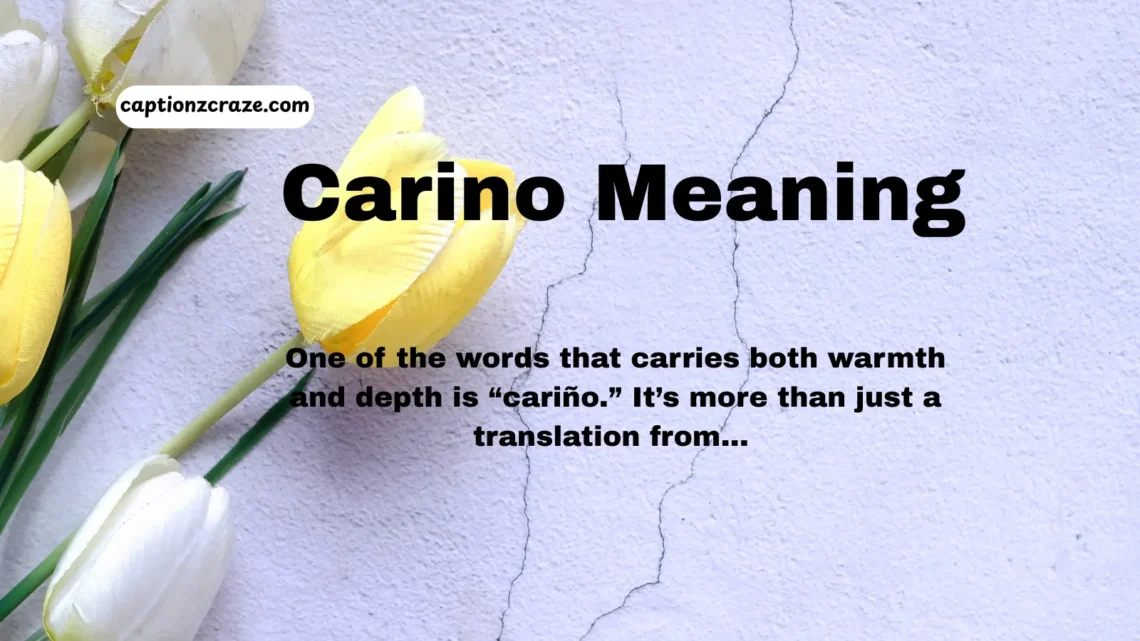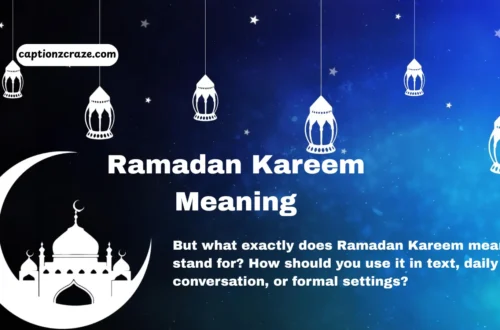Language is like a living river—it flows, changes, and takes on new shapes depending on culture and context. One of the words that carries both warmth and depth is “cariño.” It’s more than just a translation from Spanish to English; it’s an emotion, a cultural gesture, and a reflection of human connection. If you’ve ever wondered about carino meaning, its usage in text, and whether it leans toward romance or friendship, this guide unpacks everything you need to know.
We’ll also explore professional, casual, and polite alternatives to the phrase, while showing you exactly how to use cariño naturally in conversations—whether face-to-face or online. By the end, you’ll not only know the definition but also how to master its nuance like a native speaker.
What does “carino meaning” mean in text?
When someone writes “cariño” in text messages, they’re expressing affection, care, or tenderness. In English, it often translates to “darling,” “dear,” “sweetheart,” or simply “care/affection.” However, the tone depends heavily on context. For example:
- A romantic partner might text “Buenas noches, cariño” meaning “Good night, darling.”
- A parent might use it for a child, much like saying “sweetie.”
- Friends sometimes use it to express warmth without romantic undertones.
So, in texting culture, cariño is a flexible word—it can feel romantic, parental, or friendly depending on who’s using it and how.
Cariño Meaning in Spanish vs. English
The word cariño comes from Spanish and directly means “affection” or “fondness.” But like many emotional words, it doesn’t have a perfect one-to-one English translation. While in English you might choose between “honey,” “sweetheart,” or “dear,” cariño acts as a universal term of endearment that can fit multiple situations.
In English, carino meaning usually depends on tone:
- Neutral/General: Affection or care.
- Romantic: Darling, sweetheart.
- Parental/Familial: Sweetie, little one.
Cariño Def: Simple Explanation
If you’re looking for a straightforward carino def, it’s “affection or tender feeling toward someone.” But keep in mind—it’s also commonly used as a pet name for loved ones. For example:
- “Te quiero mucho, cariño” → “I love you so much, darling.”
The word carries emotional warmth that simple translations can’t fully capture.
What does Cariño mean in English?
In English, cariño can mean:
- Affection (general sense).
- Darling, honey, sweetheart (romantic sense).
- Dear (friendly or polite sense).
Its versatility is why you’ll often see people keeping the word cariño untranslated, especially in poetry, songs, or personal messages, because it holds cultural weight.
Is Cariño Romantic?
Yes—and no. The beauty of cariño lies in its flexibility. It can be romantic when used between couples. But it’s also non-romantic when parents use it for their children or when close friends want to express warmth. Context is everything.
For example:
- Romantic: “Cariño, eres lo mejor que me ha pasado” (Darling, you’re the best thing that happened to me).
- Familial: “Ven aquí, cariño” (Come here, sweetie).
So, while English often divides endearments into “romantic” or “platonic,” cariño comfortably covers both.
9 Real-Life Examples of Using Cariño
Here are nine clear examples to show how cariño works in daily speech and text:
- Romantic partner: “Te extraño mucho, cariño” (I miss you so much, darling).
- Parent to child: “Duerme bien, cariño” (Sleep well, sweetie).
- Between close friends: “Gracias por escucharme, cariño” (Thanks for listening, dear).
- Comforting someone: “Tranquilo, cariño, todo estará bien” (Calm down, love, everything will be okay).
- Playful tone: “Cariño, ¿otra vez olvidaste las llaves?” (Darling, did you forget the keys again?).
- Romantic texting: “Buenas noches, mi cariño” (Good night, my darling).
- Family setting: “Eres mi orgullo, cariño” (You’re my pride, sweetheart).
- Supportive tone: “Estoy contigo, cariño” (I’m with you, dear).
- Cultural expression: In songs or poems, “cariño” often conveys deep emotional affection.
Related Post: ATP Meaning Texting – Complete Guide to Its Use and Alternatives
1. Cariño Meaning in Everyday Conversations
In daily talk, cariño is like a linguistic hug—it wraps words with warmth. You’ll hear it at home, in friendships, and in romantic settings.
2. Cariño Meaning in Text Messages Explained
In texting, cariño acts as a digital sign of affection. A single word can soften tone, making messages feel more caring and intimate.
3. Cariño Meaning in Relationships
Between couples, it’s the Spanish equivalent of “baby” or “darling.” It’s intimate, tender, and often used in sweet exchanges.
4. Cariño Meaning Between Parents and Children
Parents often call their children cariño as a loving nickname, just like “sweetie” or “my love.” It’s affectionate, not romantic.
5. Cariño Meaning in Songs and Poetry
Latin music often uses cariño to express deep affection or heartbreak. In poetry, it symbolizes love beyond surface-level attraction.
6. Cariño Meaning in Different Spanish-Speaking Cultures
In Mexico, Spain, and Latin America, cariño might carry subtle differences. In Spain, it’s common in daily talk, while in Latin America, it leans more toward intimacy.
7. Cariño Meaning in Polite Speech
Sometimes cariño is used politely, like calling a shopkeeper “cariño” the way English speakers might say “dear.”
8. Cariño Meaning in Online Chats
In online culture, using cariño softens text-based communication, making digital conversations feel warmer.
9. Cariño Meaning vs. English Equivalents
While English has many separate words—dear, honey, love—cariño unites them, making it versatile but harder to directly translate.
10. Cariño Meaning in Professional Settings
Although not common professionally, in some Spanish offices, a casual “gracias, cariño” may appear in friendly, informal exchanges.
Polite, Professional, and Casual Alternatives to Cariño
While cariño is rich and warm, sometimes you’ll need alternatives depending on the setting:
- Polite alternatives: “Dear,” “Esteemed colleague,” “Respected friend.”
- Professional alternatives: “Valued partner,” “Respected client.”
- Casual alternatives: “Sweetie,” “Honey,” “Love,” “Buddy” (non-romantic context).
These choices help you adapt affection across different tones—from emails to intimate conversations.
Tips for Choosing the Best Alternative
- Consider relationship level → Is this romantic, friendly, or professional?
- Check cultural context → In English, “honey” may sound romantic, but in Spanish, “cariño” isn’t always so.
- Mind the tone → Written words can feel colder; using cariño in text helps soften them.
- Adjust for age → A grandparent calling a child cariño feels natural, but saying it to a stranger may feel odd.
FAQs on Carino Meaning
1. What does cariño mean in English?
It means affection, love, or endearment, often translated as darling, sweetheart, or dear.
2. Is cariño always romantic?
No, it can be romantic, parental, or simply affectionate depending on the context.
3. Can friends call each other cariño?
Yes, close friends may use it to show warmth without romantic undertones.
4. Does cariño mean love?
Not exactly—it means affection, but it’s often used by people who love each other.
5. How is cariño different from amor?
Amor directly means love, while cariño means affection or tenderness.





